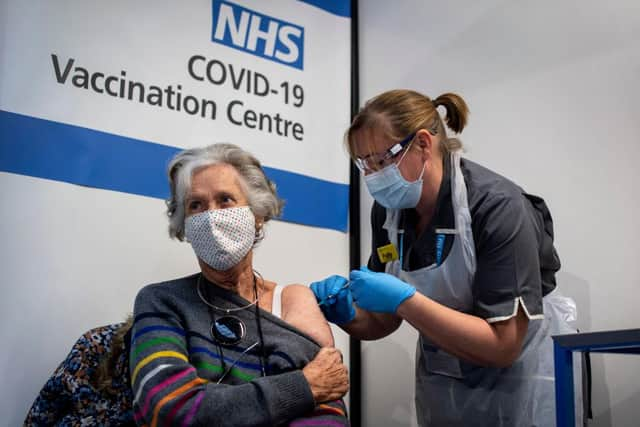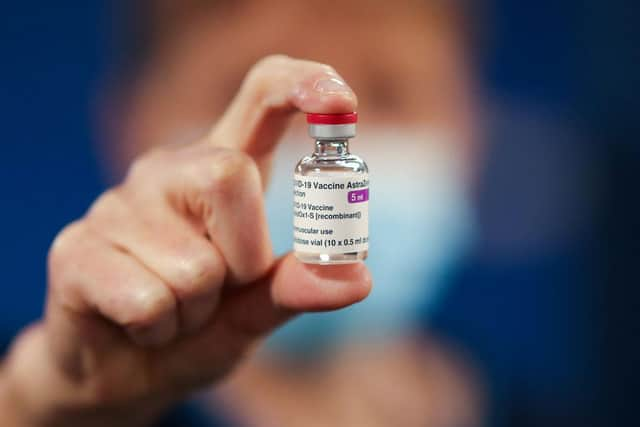New Public Health England study suggests a single dose of Covid-19 vaccine ‘cuts transmission by up to half’
and live on Freeview channel 276
According to a new study from Public Health England (PHE), a single dose of a Covid-19 vaccine can slash transmission by up to half.
The breakthrough findings offer further hope that the pandemic can be brought under control as vaccinated people are far less likely to pass the virus onto others.
Advertisement
Hide AdAdvertisement
Hide AdThe new study found that people given a single dose of either the Pfizer BioNTech or Oxford/AstraZeneca vaccines – and who became infected at least three weeks later – were between 38 per cent and 49 per cent less likely to pass the virus on to people living in their homes, compared to those who were unvaccinated.


Protection was seen from around 14 days after vaccination, with similar levels regardless of a person’s age.
Other studies have already shown that both vaccines are highly effective at stopping people getting sick and ending up in hospital.
What does this mean for lockdown easing?
The study, which has yet to be peer-reviewed, included over 57,000 people living in 24,000 households who were the contacts of a vaccinated person. Most of the people in the study were under the age of 60.


Advertisement
Hide AdAdvertisement
Hide AdThey were compared with nearly one million contacts of people who had not had a vaccine.
Contacts were defined as secondary cases of coronavirus if they tested positive two to 14 days after the initial household case.
Experts will now assess whether two doses of vaccine can cut transmission of the virus even further, and more work is being carried out on transmission in the general population.
PHE said similar results could be expected in places where the risk of transmission is similar to the home, such as shared accommodation and prisons. The study included data from January and February, when the Kent strain was dominant in the UK.
Advertisement
Hide AdAdvertisement
Hide AdDr Mary Ramsay, head of immunisation at PHE, said: “Vaccines are vital in helping us return to a normal way of life… I encourage anyone who is offered a vaccine to take it as soon as possible.
“While these findings are very encouraging, even if you have been vaccinated, it is really important that you continue to act like you have the virus, practise good hand hygiene and follow social distancing guidance.”
‘Vaccines save lives’
Data out last week from the national Covid-19 Infection Survey run by the University of Oxford and the Office for National Statistics (ONS) also found that vaccines are likely to cut transmission.
Just one dose of either the Pfizer BioNTech or AstraZeneca vaccines cut coronavirus cases by two-thirds and were 74 per cent effective against symptomatic infection, according to the real-world UK data.
Advertisement
Hide AdAdvertisement
Hide AdAfter two doses of Pfizer, there was a 70 per cent reduction in all cases and a 90 per cent drop in symptomatic cases – these are the people who are most likely to transmit coronavirus to others.
Health and Social Care Secretary Matt Hancock said: “This is terrific news – we already know vaccines save lives and this study is the most comprehensive real-world data showing they also cut transmission of this deadly virus.
The Pfizer and AstraZeneca vaccines are credited with having saved 10,400 lives among the over-60s as of the end of March.
A message from the editor:
Thank you for reading. NationalWorld is a new national news brand, produced by a team of journalists, editors, video producers and designers who live and work across the UK. Find out more about who’s who in the team, and our editorial values. We want to start a community among our readers, so please follow us on Facebook, Twitter and Instagram, and keep the conversation going.